George Broussard interview – Come get some personal adventure game insights from the co-creator of Duke Nukem
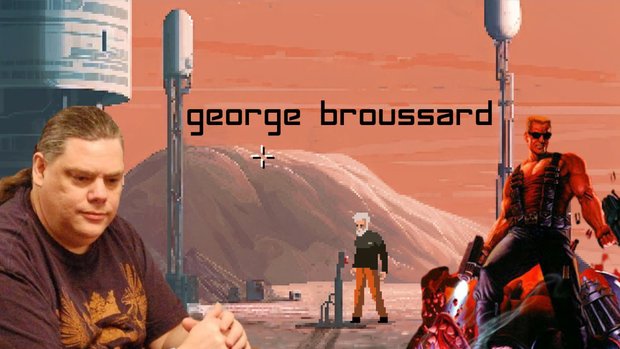
- 0 Comments
If you're exclusively an adventure gaming diehard, the name might not immediately strike a chord. But for fans of 90s action games, George Broussard is a living legend. Among his many notable career accomplishments, he's the co-founder of Apogee Software and its subsidiary 3D Realms, a key player in the shareware movement, and perhaps most famously, the co-creator/designer of the iconic Duke Nukem series.
Despite his inextricable association with the first-person shooter genre, action games weren't his first love, nor are they his only interest: Broussard is also an outspoken fan of and advocate for adventure games. In his retirement from full-time game development, he's taken part in respected game-creation competitions like Ludum Dare and Adventure Jam, crafting contest finalists Stowaway and The Third Wish, two point-and-click adventures reminiscent of LucasArts classics.
In my recent interview with George, the mind behind some of the most iconic action games of all time delves into the finer points of adventure gaming. Read on as he shares his appreciation for indie developers, tells us the surprising adventure game character who influenced Duke Nukem's creation, and weighs in on the timeless Sierra vs. LucasArts debate.
Thank you for taking the time to speak with us today, George. You are a true gaming pioneer and legend, and we're honored to have a moment of your time. How are you doing today?
George Broussard: I'm doing great. Thanks so much for contacting me to talk about adventure games.
In reading about the history of Apogee Software, I saw that you and [Apogee co-founder] Scott Miller bonded over your enthusiasm for text adventure games, and that some pre-Apogee games were themselves text adventures. Can you tell us a little about your history with the adventure genre and what impact it had on your career?
George: Scott and I were close friends before adventure games. We met in high school in the late 70s and hung out all the time as we frequented local video arcades. We also played some early Infocom games on C64s as the home computer revolution was happening and we were both into computers.

My history of adventure games started with Infocom (I won't count Wumpus in high school on the teletype machine!). Zork was pretty big and basically popularized the genre. There were text adventures before but nothing like Zork, which went commercial and had a box in a store and was on hundreds of thousands of computers. I played many Infocom games in the early 80s. Couple of Zorks, Starcross, Suspended, Planetfall, Enchanter, Infidel and Sorcerer were my favorites. After that I think Infocom largely made too many games too fast and became sort of a puppy mill so I lost interest and headed off to the Amiga and PC clones in the mid-80s.
As for impact on my career, I think the 80s were formative in teaching me game design. I'd always tinkered with programming and had an interest in making games. When playing a game I'd just note things that annoyed or frustrated me. Back then there weren't really any resources or education on game design and there was no internet so you just learned through general interest as a player. I formed very strong opinions on things like red herrings, dead ends, death, starvation and what I felt were "fair" puzzles in an adventure game. That all went into the pot and just simmered over time.
The appeal of the genre, for me, was simply the exploration and puzzle solving. It was fantastic to read a rich description of a room and let your imagination fill in the blanks while paying attention to keywords that might be important. It was extremely fun to wander around, collect items and try to solve the puzzles. It was challenging, right down to having to make your own maps for a game with as many as 80 rooms to explore. I recall many Infocom games taking weeks or months to complete. If you were stuck, you were stuck. Fortunately the better games were fair and had all the information you needed in the text descriptions. Zork, however, was not fair at all but that was okay as it was early and nobody knew any better. People just did things because they were cool. Those guys were learning game design as they produced the games.
Traditionally there's been something of a rift between fans of action games and fans of adventure games. You're responsible for creating or publishing some of the most landmark titles in the action and FPS (first-person shooter) genre, but are also an outspoken adventure game fan. How do you compartmentalize your design philosophy between the two genres, and do you think the delineation is important?
George: I don't really think of it that way. A game is a game and a genre is a genre. A lot of design principles cross genres. When working in any genre you just try to do what's best for the type of game you're making. An example: All early Apogee games had save and load and we included cheat codes in the manuals. This came from disliking spending $50 for a game and not being able to save or getting stuck somewhere and shelving the game. My thought was, you spend your $50, you can play any way you like. Dying in an adventure game always pissed me off. It was never fair. It was like the designer was laughing at you and the result was just wasting your time. Even on some Infocom games like Planetfall you could starve to death and get in a bad state, and if you hadn't saved at the right time then you might lose an hour.
Roberta Williams once cited Duke Nukem 3D as an influence on her action-tinged final King's Quest entry, Mask of Eternity. Duke Nukem 3D also distinguished itself from other FPS games of the time for its environmental interactivity, a design feature largely associated with adventure games. Were there any adventure games that were an influence in creating Duke?
George: I didn't really know about Roberta's comments on Duke until the Colossal Cave PR interviews but it all makes sense in the timeline back then. Doom, Duke and Quake shook things up a lot from 1993-1996. In short, faster hardware killed adventure games by enabling fast-paced shooters. There was no going back, and due to the visceral nature and action the genre quickly became the most popular and every publisher wanted action games and slower-paced adventure games fell by the wayside, which was a shame. It bothered me when I learned that Grim Fandango would be Lucasarts's last adventure game but I understood the economics.
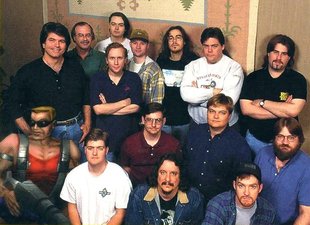
I don't recall any direct adventure game influence when making Duke Nukem 3D, but as always, when you make things, you are influenced by all the things you saw and played up to that point. Interactivity is always an immersive thing so once we had a dedicated Use key to open doors or flip switches, you just look for more places to integrate using something. Everything evolved from that over lots of iteration and thinking, “Can we use a toilet? Why not? What happens when you do that?” Then you apply that sequence of questions to everything in the game and pretty soon it becomes clear that if it looks like you should interact with something, you should let the player do that.
There is one rather important anecdote about adventure games influencing Duke Nukem 3D. Full Throttle came out in late 1995 and we were getting close to the end of Duke 3D. While playing Full Throttle I had a discussion with a programmer at Apogee, Jim Dosé, who was also playing Full Throttle and we talked about how Ben's voice in Full Throttle sounded like what we imagined Duke would sound like. Gruff, gravelly and low-pitched. Typical tough guy. A few days later we tracked down a voice director we knew. I sent her a test monologue on a cassette tape that was a recording of the opening from Full Throttle where Ben talks about Maureen and the smell of asphalt and trouble. I just told the voice director: "This is the ballpark of what we're looking for; see if you know someone like this?" We got a great audition back and I started writing lines for Duke to say and finding places in the game that made sense for him to talk. It really transformed the game. Nobody had done that at the time in an FPS game. Right place at the right time, but I credit Full Throttle and that conversation with Jim for the inspiration.
A rather famous anecdote about Wolfenstein 3D is that id Software once almost sold to Sierra On-Line, known largely for their adventure games, before its release. As publisher of Wolfenstein 3D, can you speak on your perspective on this? Where would Apogee have fit into this picture? And do you think the landscape of gaming would have changed had the deal gone through?
George: I don’t remember the timing or if it was before or after release. Before sounds right. I remember talking to John Romero about the offer. As far as Apogee was concerned, Sierra would have had to buy us out of our contract. But at that point I think Keen was pulling in something like 50k a month and we all knew Wolfenstein was going to be a monster hit. It was such a big deal that I actually had to write a game to free id from their contract with Softdisk, who was making some noise post-(Commander) Keen about id owing them another game. I didn’t want to do it or be bothered with it, but we all saw Wolfenstein as too big a deal, so I wrote a game called ScubaVenture in two months and Softdisk accepted it, and that freed the way for us to publish Wolfenstein. So that was another hurdle getting Wolfenstein out beyond the Sierra offer.
I think Wolfenstein made something like five million dollars in 1992. That was more money than any of us had ever seen and id Software received half of that. So they made the right call and the rest is history.
I think the landscape of gaming might be different if they’d sold to Sierra but you never know. Things may have been fine under Sierra but most certainly not after Sierra was acquired.
There were many phenomenal developers of adventure games during its golden era, but one classic gamer feud remains: Sierra vs. LucasArts. Do you have a preference?
George: My preference was for LucasArts. I'd played a couple of Sierra games early on and I finished Space Quest 3, but from a design standpoint the LucasArts games were just better. I sort of went from Infocom, into Amiga games mid-80s, then back to PC late 80s and into LucasArts. You can't blame any design issues from the 80s when everything was new and everyone was winging it, right? But the LucasArts games solved all the key issues that Sierra games had. They also had the benefit of shipping at a later time and voice acting being a standard thing from 1992/3 on, which elevated the games tremendously. I have a hard time playing adventure games without great voice acting.
What are some of your favorite adventure games from what is now considered the golden era (the mid-80s to the mid-90s)? Who are some pioneering adventure game developers you most admire?
George: My favorites from Infocom were Starcross, Planetfall, Infidel, Enchanter and Sorcerer. My favorites from LucasArts were Indiana Jones and the Fate of Atlantis and The Dig but I loved them all. Just seems silly to list 7-8 games. I vividly remember playing Full Throttle, The Curse of Monkey Island and Grim Fandango. Day of the Tentacle is a classic.
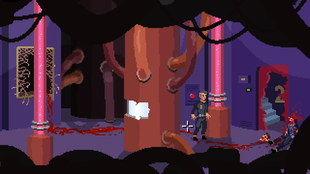
I admire all the people that formed and set the bars for the genre. In particular, for me, Infocom guys like Steve Meretzky, Dave Lebling, Michael Berlyn. Of course, Roberta Williams. I admire all the design leads on all the LucasArts games. It's a murderer's row of all-time greats, imo. Ron Gilbert, Tim Schafer, Hal Barwood and Noah Falstein, Jonathan Ackley ... where do you draw the line? LucasArts never made a bad adventure game. It was a magical place for seven or eight years.
I like good puzzles and harder puzzles. I wish more modern adventure games focused more on puzzles vs dialogue. I don’t think people like puzzles today, and to me that’s 50% of the genre. Otherwise, watch a TV show.
Although the adventure game genre was largely declared dead by the gaming press by the late 90s, since then there have been far more released than during its golden era. How do you feel about how the genre has transformed over the years, and what have been some of your favorite games or developers from the last two decades?
George: If we're keeping it to point-and-click adventure games, then with few exceptions I think the genre has transformed into being exclusively indie, hobbyist efforts from passionate fans looking to turn a hobby into a profession. The good news is that modern tools can allow people to make these sorts of games fairly easily (from a technical standpoint) and that's why you see so many today.
But the bad news is that in most cases the Steam sales aren't all that great. There are certainly some outliers but it’s a hard genre. Outside of a handful of games a year, most of these games do pretty poorly on Steam. So, I wonder where the audience is? Is the PnC pond only large enough to support 3-4 games a year? Are games having trouble standing out? Are there too many games in the world fighting for your time? Probably all of that and more. I hope to see more games rewarded as time goes on. There seems to be a bit of a groundswell of games the last two or three years.
As for favorite games and developers...In 2022 I really enjoyed The Excavation of Hob's Barrow and Beyond the Edge of Owlsgard. And of course Return to Monkey Island, but that's an edge case with a very large budget. I like all the Wadjet Eye games I've played like Unavowed and Blackwell. I like Francisco Gonzales's games and enjoyed Lamplight City and Shardlight quite a bit and look forward to Rosewater. I also look forward to Adam and Joseph Riches’s game Loco Motive and especially The Drifter from Powerhoof. There are a lot of very talented people making great games. My Steam wishlist is full of adventure games to get to.
In recent years, you've participated in the Adventure Jam and developed several indie games, including point-and-click adventure titles, for the public as freeware. How did you get started in the game jam community? And for readers who might not be familiar with your recent adventure titles (Stowaway and The Third Wish), can you tell us a bit about them? Would you ever consider making a full-length commercial adventure game?
George: I really retired in about 2010 but I kept seeing Ludum Dare come up in my Twitter timeline. At the same time I'd been playing with Unity and starting to program again after not having done so in a long time. One thing led to another and I started doing Ludum Dare games. I think I did about 13 of them and I had a fun time trying to make something in 48 hours, as hellish as that is!
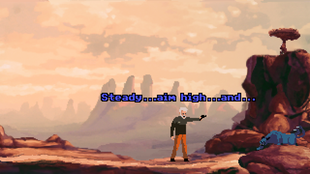
Then I think I saw Peridium from Dave Lloyd of Powerhoof in an Adventure Jam. I loved that game. I sort of credit Peridium as resparking my interest in adventure games and poking around the modern scene. A bunch of time passed and I kept watching Dave's efforts and talked to him and others in the community. I'd been playing with my own adventure game engine, and I figured the jam would be an external source of pressure to get my engine done enough to make something. That's when I made Stowaway for Adventure Jam 2022, which got 6th place out of 97. I evaluated a bunch of adventure game engines in early 2023 and PowerQuest won out. It’s great. That's what I used to make The Third Wish for Adventure Jam 2023, which got 10th place out of 350.
As for making a full-length game, I may try some smaller things first. I'm currently debating extending Stowaway and The Third Wish to both be longer and have more puzzles, more animation, more polish, and I'd make a new game, maybe two, and bundle them together as a Twilight Zone-style anthology for Steam. That might be a nice little toe-in-the-water project before committing to a larger game.
But I love the genre and there are endless stories to tell in endless settings and with endless puzzles, so I hope to spend some time here enjoying myself.
Having worked on major (what would today be considered Triple-A) releases and also as an indie game developer, how do you think the barrier of entry into the game industry has changed from when you started to today?
George: For smaller indie developers the barrier to entry has been obliterated. The only barrier is self-interest and a willingness to put in the work to learn how to make a game. Between YouTube, Google, and something like Unity (or any other modern engine) there's nothing to stop anyone from making a game. Part of why you see so many point-and-click games today is due to Adventure Game Studio, Adventure Creator, Visionaire or PowerQuest lowering that barrier for creators. You no longer have to be an uber coder to make a game.
It's much easier to make a game today but it's also much harder to sell it and reach an audience due to the competition and number of games out there.
There's a lot of appeal for one-person or small adventure game teams to incorporate AI-assisted assets into their work to save time and money, or to accomplish something artistically that may be out of their wheelhouse. What are your thoughts on AI art as a tool to create adventure game assets? And do you create all your own assets?
George: AI will be as much a game development tool as Photoshop or anything else is. I think AI will raise the level of everyone's work eventually. It will allow entry for some people who can't create art and it will assist a lot of professionals or mid-level artists in various ways. That assistance will be a wide range and vary on a case-by-case basis depending how each artist incorporates it. The genie is out of the bottle and there’s no turning back.
For Stowaway I created all the art by hand and rooms took me 3-5 hours. For The Third Wish I generated backgrounds, which were then heavily edited, altered and tweaked and it still took me 3-5 hours per room. But I think the results were better overall and I'm still learning. All the characters, animations and UI were done by hand. It's an evolving process and things change every month.
Thank you for taking the time to speak with us George! You are a legend and I really appreciate the opportunity to pick your brain. Are there any adventure games or other projects you have in the works?
George: Thanks for the interview and interest. It was fun. If people want to follow any future game development updates, just follow my Twitter @georgebsocial.

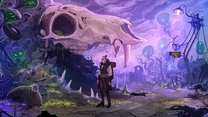
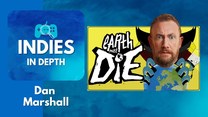
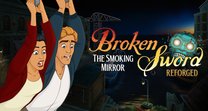





0 Comments
Want to join the discussion? Leave a comment as guest, sign in or register in our forums.
Leave a comment